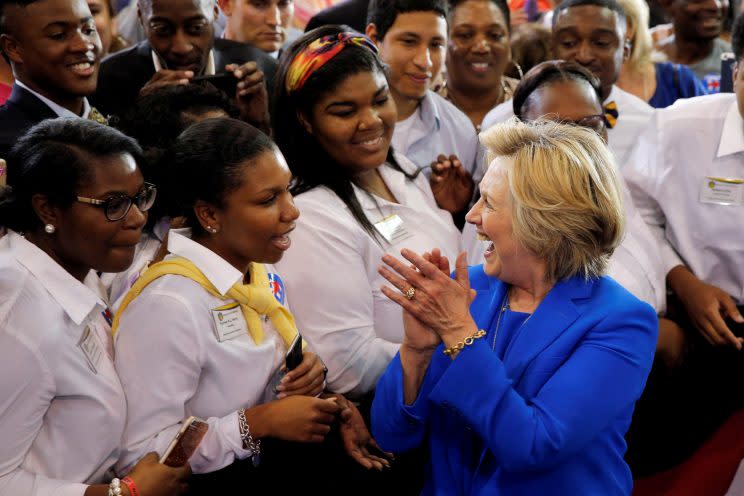Clinton campaign tries to win over millennials in campus push

Hillary Clinton is pushing her most popular surrogates to college campuses and giving a speech aimed at millennials as polls show her losing their crucial support to third party candidates.
A new Quinnipiac poll released last week found that Clinton’s support drops a staggering 24 points among voters aged 18 to 34 in a four-way race with Jill Stein and Gary Johnson. Donald Trump is still more unpopular with young voters than Clinton is, with only 26 percent of them supporting him in a four-way match, compared to Clinton’s 31 percent. But the Clinton campaign is relying on younger voters to help fuel her victory. President Obama won 60 percent of their votes in 2012, a margin that was crucial to his win.
The campaign deployed first lady Michelle Obama, Sen. Elizabeth Warren and Sen. Bernie Sanders to give speeches on college campuses in swing states this weekend. (The first lady and Sanders are much more popular among millennials than Clinton, according to a recent YouGov poll. Trump trails them all significantly, with more young people seeing him unfavorably than favorably.)
Clinton will also give a speech aimed at millennials at Temple University, in Philadelphia, Monday, which will emphasize the specific policy plans she will support aimed at making their lives better. She’ll spotlight her plan for free community college and “debt free” college for families making less than $125,000 a year.
So far, young voters haven’t taken to Clinton the way they did for Obama, perhaps in part because she’s been on the political scene for their entire lives, while Obama was a young, fresh face who stirred crowds with his promise of change. Obama referenced this in his speech on behalf of Clinton last week. “I understand we’re a young country, we are a restless country,” he said. “We always like the new, shiny thing. I benefitted from that when I was a candidate.” He urged voters not to take her for granted simply because she’s been around for decades.
On Friday, Michelle Obama directly addressed a lack of enthusiasm around Clinton at a speech at George Mason University and reminded young voters how important they are to the election. “When I hear folks saying they don’t feel inspired in this election, well, let me tell you, I disagree,” she said, while arguing that she is “inspired” by Clinton’s persistence.
“In 2012, voters under the age of 30 provided the margin of victory for Barack in four key battleground states,” the first lady said. “So for any of you who might be thinking that my vote does not really matter, that one — one person cannot really make a difference in this election, I want you to consider this.”
Meanwhile, Sanders, who won three-quarters of the youth vote over Clinton during the primaries, rallied college students in Akron, Kent and Canton, Ohio, Saturday, pressing them to vote and take the election seriously. On Friday, Sanders, an independent for much of his life, told a crowd, “Now is not the time for a protest vote.” Warren spoke at Ohio State University Saturday and will appear at Cleveland State Sunday.
At headquarters in Brooklyn, the campaign’s sizeable millennial outreach team has been busy unveiling its college calculator, which shows users how much money they would save on college costs or debt under Clinton’s proposed plan. The team’s head of campus outreach, Kunoor Ojha, came to the Clinton campaign from Sanders’ team. The campaign also has millennial outreach directors in many swing states.
“We have work to do, there’s no parsing that fact,” said Christopher Huntley, Clinton’s director of millennial media. “We have to let young people know that Secretary Clinton is the only candidate in the race that’s going to help them create the future they want.”
Huntley said millennial voters are concerned with authenticity in their candidates, which the Clinton campaign has taken to mean emphasizing Clinton’s detail-oriented focus on specific plans that will help them, not trying to make her seem “hip.”
“We’ve found it’s most successful to talk about her issues and her track record,” Huntley said. “We aren’t getting requests for her to do dances or things like that.”
The Clinton-supporting super-PAC Priorities Action is also unveiling ads that will aim at convincing young voters that backing a third-party candidate is tantamount to voting for Trump, the Wall Street Journal reported.
Adam Green, founder of the liberal Progressive Change Campaign Committee that now backs Clinton, said the candidate should emphasize her college plan to win over young people, much as Sanders’ liberal proposals attracted millennials in the primary. Clinton criticized Sanders’ free college plan during the primary as an unrealistic proposal that would give the children of the wealthy access to free college when they didn’t need it. In July, she adopted a modified version of Sanders’ plank, announcing that for 83 percent of families, college would be tuition free.
“Young people and voters skeptical of the political process will be engaged if they think it’s around big ideas that will truly be game changers in their own lives,” Green said. “The ability to graduate from any college or university with zero debt means people can move out of their parents’ homes, they can afford to get married and start a life, they can even take risks and start a business. That impacts the trajectory of people’s lives.”

